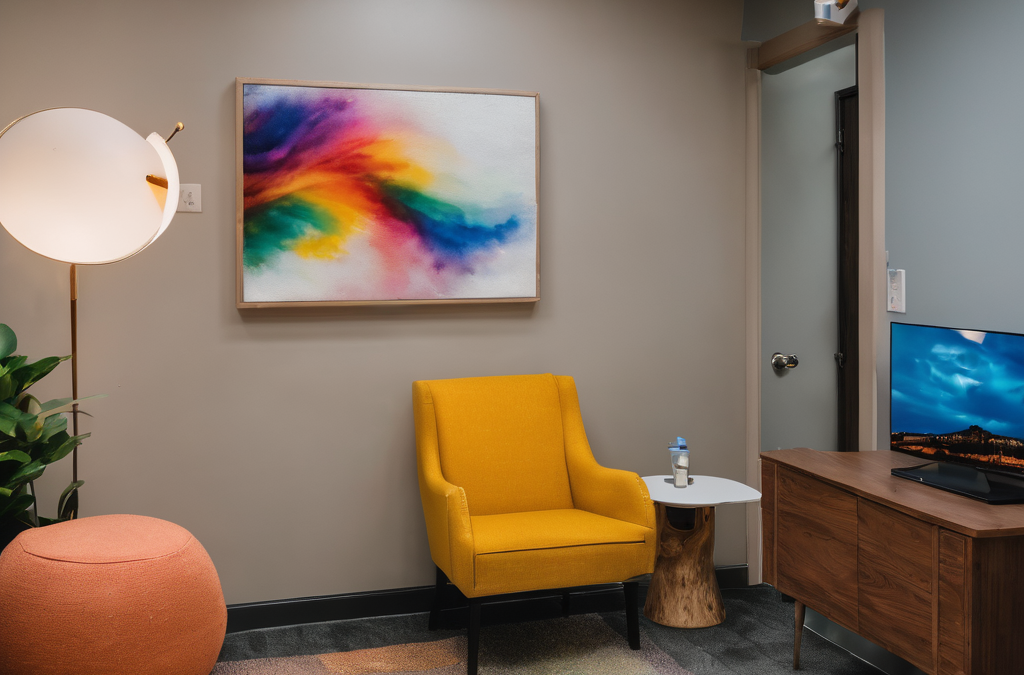Table of Contents
What to Look for in an LGBTQIA+ Friendly Therapist
Questions to Ask Potential Therapists
Finding the Right Balance of Sexuality and Faith
Ready to Find Your LGBTQIA+ Friendly Therapist?
Overcoming Hesitation Around Counseling
Books, Apps and Other Resources
Seeking mental health support can be daunting for anyone, but finding a therapist who understands and affirms your LGBTQIA+ identity can make the process even more challenging. However, there are professionals in Denver specifically equipped to support the needs of LGBTQIA+ individuals. This guide will help you locate and connect with quality, identity-affirming mental healthcare.
What to Look for in an LGBTQIA+ Friendly Therapist
It’s important to find a therapist who is welcoming and respectful of your sexuality and gender identity. Here are some things to keep in mind during your search:
- Look for LGBTQIA+-specific certifications like WPATH training or certifications from LGBTQIA+ organizations. This demonstrates competency.
- Ask direct questions about their experience with LGBTQIA+ clients and issues. You want at least several years of specialty work.
- See if they display LGBTQIA+ symbols like pride flags. While not definitive, visual cues signal openness.
- Notice use of gender inclusive language on forms, websites, etc. Attention to language is telling.
- Request referrals from LGBTQIA+ friends who recommend their therapist. Peer validation matters.
- Trust your instinct during consultations. You want a provider you feel comfortable being open with.
Questions to Ask Potential Therapists
Interview potential therapists to get a sense of their competency in LGBTQIA+ issues. Here are some good questions to ask:
- How familiar are you in working with LGBTQIA+ clients? How many LGBTQIA+ clients have you worked with?
- What training have you had for providing LGBTQIA+-affirming care?
- How do you help LGBTQIA+ clients address issues like coming out, transitioning, or navigating unaccepting families?
- Are you knowledgeable about LGBTQIA+ resources in the community? Can you provide referrals if needed?
Look out for any signs of discomfort, ambiguity, or judgment when asking these questions. This could indicate the therapist may not be the best fit.
Finding the Right Balance of Sexuality and Faith
For many LGBTQIA+ individuals, exploring their identity often involves navigating their religious upbringing or current faith. This process can be deeply personal and complex. Here are some tips:
- Seek out therapists knowledgeable about reconciling sexuality and faith. Ask what their experience is.
- Connect with LGBTQIA+ groups from your faith background. Hear how others have made confident decisions..
- Take things slowly. Know that your sexuality and faith don’t have to be in perfect alignment immediately.
- Focus on self-love and self-acceptance throughout your spiritual journey of discovery.
With patience and the right support, you can find a fulfilling balance of sexuality and faith.

Ready to Find Your LGBTQIA+ Friendly Therapist?
There are wonderful therapists in Denver ready to provide a judgment-free space for you to unpack the complexities of your LGBTQIA+ experience. With the considerations above, finding an LGBTQIA+ affirming therapist can be straightforward. Schedule your initial consultations, ask the key questions, and trust your intuition in selecting the right fit. You deserve mental health support that accepts and champions all of who you are.
Types of Therapy to Consider
At iAmClinic, we provide LGBTQIA+ affirmative therapy and utilize approaches that are especially effective for the LGBTQIA+ community:
- Neurofeedback helps regulate emotions, anxiety, and trauma.
- EMDR processes traumatic memories and internalized negative beliefs.
- Somatic therapy helps release trauma stored in the body.
Discuss options like these during your consultations to find the right treatment approach for you.
Overcoming Hesitation Around Counseling
Many LGBTQIA+ individuals feel uncertain about therapy due to past stigmatization. These concerns are valid, but don’t mean counseling can’t be helpful now. Today’s LGBTQIA+ affirming therapists aim to provide a radically different experience through acceptance and unconditional support. You deserve to feel whole – give counseling a chance to support you. Start with a consultation to find someone you truly click with.
Options for Online Counseling
If attending therapy in an office is not feasible, iAmClinic offers online counseling to provide greater flexibility. Our licensed therapists conduct secure video sessions tailored to LGBTQIA+ experiences and concerns. Online sessions allow you to get specialized support from the comfort of your own home. iAmClinic also offers competitive rates since we have lower overhead costs compared to traditional in-office practices.

LGBTQIA+ Community Resources
For additional support outside therapy, Denver has great LGBTQIA+ community resources including:
- The Center on Colfax which has LGBTQIA+ support groups and events.
- Colorado Crisis Line – 24/7 confidential hotline
- Rainbow Alley offers drop-in spaces and services for LGBTQIA+ youth.
Books, Apps and Other Resources
Here are some recommended resources to boost LGBTQIA+ mental wellness:
- Apps like Rainbow Heart and Calm provide meditations and mood tracking.
- The book “The Gender Quest Workbook” helps explore gender identity.
Taking care of your mental health is vital, especially as an LGBTQIA+ person navigating unique challenges and systemic discrimination. Supporting wellbeing in the LGBTQIA+ community requires access to affirming and knowledgeable mental health resources.
FAQs About Finding LGBTQIA+ Affirming Therapy
How can I tell if a therapist will be LGBTQIA+ affirming?
- Look for explicit statements on their website/materials that they are LGBTQIA+ allied or friendly. Also ask direct questions about their experience and approach during initial consultations.
What qualifications should I look for in LGBTQIA+ therapists?
- Relevant credentials like LGBT, LGBTQ or LGBTQIA+ counseling certifications indicate specialized expertise.
What questions should I ask potential therapists?
- Ask how many LGBTQIA+ clients they have worked with, what specialized training they have, and how they support issues common for LGBTQIA+ individuals.
Are there differences between in-person and online counseling for the LGBTQIA+ community?
- Online counseling provides more flexibility but in-person allows for a more tangible relationship with your therapist. Assess your needs and comfort level.
How can I find an LGBTQIA+ therapist that fits my budget?
- Ask about sliding scale fees based on income. Also look into employee assistance programs which often cover therapy sessions.
What type of therapy is typically best for LGBTQIA+ individuals?
- CBT, somatic therapy, person-centered therapy and EMDR tend to be effective in addressing LGBTQIA+ concerns.


